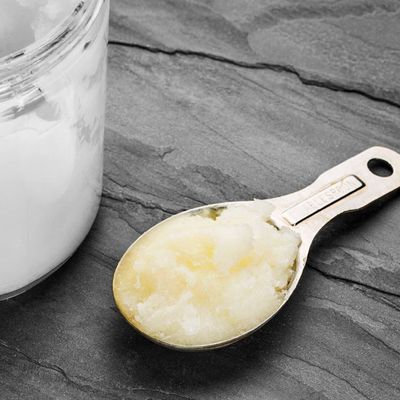
Many people believe coconut oil is good for you, saying that it can boost good cholesterol and help with weight loss, plus it has a relatively high smoke point, making it safer for cooking at high temperatures. But in a recent survey, nutritionists did not agree that the fragrant emollient is healthy or magical. Why is that? Here’s what you should know about cooking with coconut oil versus other oils.
Coconut oil is higher in saturated fat than butter (90 percent versus 64 percent) and a recent study concluded that butter is neither healthy nor unhealthy, it’s kind of neutral. Olive oil, on the other hand, is 70 percent monounsaturated fat, which has been proven with lots and lots of research to have only positive effects on cholesterol, raising the good and lowering the bad, says Libby Mills, M.S., R.D.N., L.D.N., and a spokesperson for the Academy of Nutrition and Dietetics.
Proponents of coconut oil harp on the fact that about half of its saturated fat comes from medium-chain fatty acids, or MCTs, which have the ability to increase “good” HDL cholesterol, but they often forget about the other half — long-chain fatty acids, which can raise “bad” LDL cholesterol, Mills says. Any potential increases in good cholesterol would be offset by larger increases in the bad stuff.
MCTs are also touted as a weight-loss aid. They’re metabolized faster by the body than long-chain fats are because they don’t have to be broken down in the intestines first, says Saroja Voruganti, Ph.D., assistant professor of nutrition at the UNC Gillings School of Global Public Health.
In theory, this means that your body is more likely to use them for energy and less likely to store them as fat, but just adding coconut oil to your current diet won’t help you lose weight. This only works if you’re not eating more calories than your body needs, and even then it probably wouldn’t result in any drastic shifts.
Mills thinks that any alleged slimming benefits from the medium-chain fats are, again, negated by the other fats in coconut oil. “There might be some evidence for the MCT oils to increase thermogenesis, maybe increase our fat oxidation, but the bottom line is, this is if a person is only eating the MCT oil isolated from the coconut oil.” (For the record, Bulletproof Diet creator Dave Asprey says it’s MCT oil, not coconut oil, that should go in butter-spiked coffee.)
However, she does say there is a possible benefit from cooking with it. “If adding some extra-virgin coconut oil to your vegetables helps you eat them, it could turn out to be a good thing.”
Speaking of cooking, coconut-oil devotees (a group that often overlaps with CrossFit addicts) are extremely happy to tell you that it has a higher smoke point than other oils, which makes it safer to use in stir-frys and baked goods. If oil starts literally smoking, it’s breaking down and producing compounds called free fatty acids, which are associated with both inflammation and weight-gain-inducing insulin resistance. Plus it can lead to bad-tasting food.
Voruganti says the smoke point of extra-virgin coconut oil is about 350 degrees, and 400 for refined. This isn’t any higher than vegetable oil (400 to 450) or canola oil (400) or even that big of a difference compared to olive oil (325 to 375).
Smoke-point concerns mostly apply to deep frying, where a vat of oil needs to be heated up to about 375 degrees and people are tempted to reuse it since they poured out a lot. Hitting an oil’s smoke point lowers that smoke point for any subsequent uses, as does the presence of any food bits or seasoning. “You might be using all fresh oil but as it becomes contaminated, those other particles help lower the smoke point, too,” Mills says.
But Voruganti says we probably don’t need to freak out about one-and-done sautéing. “Using the same oil again and again, that creates problems, but if you use fresh oil it may not be that bad of a problem.”
Overall, Mills says that coconut oil is a mixed bag though she understands why it’s been hyped. “As a society, we’re always looking for the panacea — the one thing that’s really going to fix it all,” Mills says. “While some of the research is promising, and the MCT oils in coconut oil are very attractive, unfortunately they come with a lot of saturated fat packaging.”
Sure, you could cook with coconut oil, but it’s unclear whether it’s any better for you than olive oil, or — gasp — plain, old vegetable oil.

